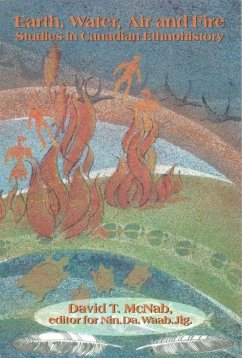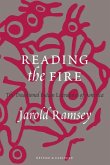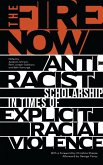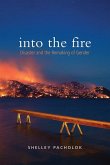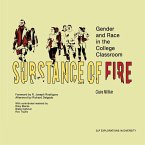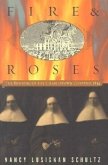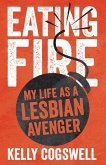Earth, Water, Air and Fire
Studies in Canadian Ethnohistory
Herausgeber: McNab, David T
Schade – dieser Artikel ist leider ausverkauft. Sobald wir wissen, ob und wann der Artikel wieder verfügbar ist, informieren wir Sie an dieser Stelle.
Earth, Water, Air and Fire
Studies in Canadian Ethnohistory
Herausgeber: McNab, David T
- Broschiertes Buch
- Merkliste
- Auf die Merkliste
- Bewerten Bewerten
- Teilen
- Produkt teilen
- Produkterinnerung
- Produkterinnerung
The contributors use a holistic approach comprising the four elements - earth, water, air, and fire - to address the diverse themes and variations in First Nations communities across Canada.
Andere Kunden interessierten sich auch für
![Reading the Fire Reading the Fire]() Reading the Fire36,99 €
Reading the Fire36,99 €![The Fire Now The Fire Now]() The Fire Now28,99 €
The Fire Now28,99 €![Into the Fire Into the Fire]() Shelley PacholokInto the Fire41,99 €
Shelley PacholokInto the Fire41,99 €![Substance of Fire Substance of Fire]() Claire MillikinSubstance of Fire26,99 €
Claire MillikinSubstance of Fire26,99 €![Fire & Roses Fire & Roses]() Nancy Lusignan SchultzFire & Roses34,99 €
Nancy Lusignan SchultzFire & Roses34,99 €![Eating Fire Eating Fire]() Kelly J CogswellEating Fire18,99 €
Kelly J CogswellEating Fire18,99 €
The contributors use a holistic approach comprising the four elements - earth, water, air, and fire - to address the diverse themes and variations in First Nations communities across Canada.
Produktdetails
- Produktdetails
- Verlag: Wilfrid Laurier University Press
- Seitenzahl: 342
- Erscheinungstermin: 15. Juli 1998
- Englisch
- Abmessung: 221mm x 150mm x 23mm
- Gewicht: 499g
- ISBN-13: 9780889202979
- ISBN-10: 0889202974
- Artikelnr.: 42340589
- Herstellerkennzeichnung
- Libri GmbH
- Europaallee 1
- 36244 Bad Hersfeld
- gpsr@libri.de
- Verlag: Wilfrid Laurier University Press
- Seitenzahl: 342
- Erscheinungstermin: 15. Juli 1998
- Englisch
- Abmessung: 221mm x 150mm x 23mm
- Gewicht: 499g
- ISBN-13: 9780889202979
- ISBN-10: 0889202974
- Artikelnr.: 42340589
- Herstellerkennzeichnung
- Libri GmbH
- Europaallee 1
- 36244 Bad Hersfeld
- gpsr@libri.de
Table of Contents for Earth, Water, Air and Fire: Studies in Canadian
Ethnohistory, edited by David T. McNab for Nin.Da.Waab.Jig
Introduction David T. McNab
Part I: Aboriginal Perspectives
Bkejwanong-"The Place Where the Waters Divide": A Perspective on Earth,
Water, Air and Fire Dean M. Jacobs
Art and Amerindian Worldviews Olive Patricia Dickason
Part II: Bkejwanong Territory
"Water Is Her Life Blood": The Waters of Bkejwanong and the Treaty-Making
Process David T. McNab
"Under the Earth": The Expropriation and Attempted Sale of the Oil and Gas
Rights of the Walpole Island First Nation during World War Rhonda Telford
The Reverend Simpson Brigham (1875-1926): The Worlds of Henry Ford and
Simpson Brigham Collide Jim Miller
Part III: Mi'kma'ki and the Mi'kmaq Nation
Mi'kmaq Fishing in the Maritimes: A Historical Overview Janet E. Chute
"We Cannot Work Without Food": Nova Scotia Indian Policy and Mi'kmaq
Agriculture, 1783-1867 Theresa Redmond
Glooscap Encounters Silas T. Rand: A Baptist Missionary on the Folkloric
Fringe Thomas S. Abler
Part IV: Ontario: History, Law and Sovereignty
Colonizing a People: Mennonite Settlement in Waterloo Township E.
Reginald Good
The Six Nations Confederacy, Aboriginal Sovereignty and Ontario Aboriginal
Law: 1790-1860 Sidney L. Harring
The Uses and Abuses of Power in Two Ontario Residential Schools: The Mohawk
Institute and Mount Elgin Elizabeth Graham
The Crown Domain and the Self-Governing Presence in Northern Ontario
Bruce W. Hodgins
Part V: The North, Gender and Aboriginal Governance
Some Comments upon the Marked Differences in the Representations of
Chipewyan Women in Samuel Hearne's Field Notes and His Published Journal
Heather Rollason
Is This Apartheid? Aboriginal Reserves and Self-Government in Canada,
1960-82 Joan G. Fairweather
The Sechelt and Nunavut Agreements: Evolutionary and Revolutionary
Approaches to Self-Government Cameron Croxall and Laird Christie
Retrospect
A Meeting Ground of Earth, Water, Air and Fire David T. McNab
Contributors
Index
Contributors
Thomas S. Abler is a professor of anthropology at the University of
Waterloo. He has written widely on the Haudenosaunee and on Aboriginal
people in Canada generally.
Laird Christie teaches anthropology at Wilfrid Laurier University. He is
continuing his research on self-government in the Canadian North.
Janet E. Chute is a research associate with the School of Resource and
Environmental Studies at Dalhousie University. She is the author of a
forthcoming study entitled The Legacy of Shingwakonse which is scheduled to
be published in the spring of 1998.
Cameron Croxall is currently completing a Master of Arts degree at Trent
University, Peterborough, Ontario.
Olive Patricia Dickason, a member of the Order of Canada, is Professor
Emeritus in history at the University of Alberta as well as adjunct
professor at the University of Ottawa. Professor Dickason is well known for
her Canada's First Nations: A History of Founding Peoples from Earliest
Times. In 1997 Professor Dickason received the Aboriginal Lifetime
Achievement Award.
Joan G. Fairweather currently resides in South Africa and works at the
Centre for History and Culture at the University of the Western Cape. An
archivist at the National Archives of Canada in Ottawa, she is currently on
leave for two years and is continuing her research on the history of
apartheid.
E. Reginald Good is a historian who currently is working as a historical
research consultant for the Saugeen Ojibways in Ontario.
Elizabeth Graham, an anthropologist, resides in Waterloo, Ontario. She is
completing a study on residential schools in southern Ontario.
Sidney L. Harring teaches law at the City University of New York Law School
and the Graduate Center, City University of New York. He has published
widely on Aboriginal legal history in North America and is the author of
Crow Dog's Case (1994).
Bruce W. Hodgins is a professor of history at Trent University in
Peterborough, Ontario. Author of numerous books and articles on Canadian
history, he is an authority on the history of Northern Ontario and the Lake
Temagami area in particular.
Dean M. Jacobs is the executive director for Nin.Da.Waab.Jig., the Walpole
Island Heritage Centre, Bkejwanong Territory. He has published a number of
articles on the history of Bkejwanong and co-ordinated the publication of
the award-winning Walpole Island: The Soul of Indian Territory (1987) for
Nin.Da.Waab.Jig. In the spring of 1998 he received an honorary doctorate
from Bowling Green State University.
David T. McNab is a claims advisor for Nin.Da.Wab.Jig. and an Honorary
External Associate in the Frost Centre for Canadian Heritage and
Development Studies at Trent University. Author of numerous articles on
Aboriginal land and treaty rights as well as on Metis history, his Circles
of Time: Aboriginal Land Rights and Resistance in Ontario is forthcoming
from Wilfrid Laurier University Press.
Jim Miller resides in Port Lambton. He is Professor Emeritus at the
University of Western Ontario and former priest-in-charge of St. John the
Baptist Anglican Church on Walpole Island. Professor Miller has recently
completed, with Professor Ed Danziger, Jr., a study of residential schools
in partnership with the citizens of Bkejwanong.
Theresa Redmond is currently Litigation Project Manager for the federal
Department of Indian and Northern Affairs in Hull, Quebec.
Heather Rollason currently resides in Toronto and is completing work on
Samuel Hearne's Journal and the Chipewyan people for her PhD in history at
the University of Alberta.
Rhonda Telford is a Toronto-based historical research consultant on
Aboriginal rights for First Nations in Ontario. A PhD graduate from the
University of Toronto in 1996, she has written on Aboriginal and treaty
mineral rights as well as on the nineteenth-century Indian Department.
Ethnohistory, edited by David T. McNab for Nin.Da.Waab.Jig
Introduction David T. McNab
Part I: Aboriginal Perspectives
Bkejwanong-"The Place Where the Waters Divide": A Perspective on Earth,
Water, Air and Fire Dean M. Jacobs
Art and Amerindian Worldviews Olive Patricia Dickason
Part II: Bkejwanong Territory
"Water Is Her Life Blood": The Waters of Bkejwanong and the Treaty-Making
Process David T. McNab
"Under the Earth": The Expropriation and Attempted Sale of the Oil and Gas
Rights of the Walpole Island First Nation during World War Rhonda Telford
The Reverend Simpson Brigham (1875-1926): The Worlds of Henry Ford and
Simpson Brigham Collide Jim Miller
Part III: Mi'kma'ki and the Mi'kmaq Nation
Mi'kmaq Fishing in the Maritimes: A Historical Overview Janet E. Chute
"We Cannot Work Without Food": Nova Scotia Indian Policy and Mi'kmaq
Agriculture, 1783-1867 Theresa Redmond
Glooscap Encounters Silas T. Rand: A Baptist Missionary on the Folkloric
Fringe Thomas S. Abler
Part IV: Ontario: History, Law and Sovereignty
Colonizing a People: Mennonite Settlement in Waterloo Township E.
Reginald Good
The Six Nations Confederacy, Aboriginal Sovereignty and Ontario Aboriginal
Law: 1790-1860 Sidney L. Harring
The Uses and Abuses of Power in Two Ontario Residential Schools: The Mohawk
Institute and Mount Elgin Elizabeth Graham
The Crown Domain and the Self-Governing Presence in Northern Ontario
Bruce W. Hodgins
Part V: The North, Gender and Aboriginal Governance
Some Comments upon the Marked Differences in the Representations of
Chipewyan Women in Samuel Hearne's Field Notes and His Published Journal
Heather Rollason
Is This Apartheid? Aboriginal Reserves and Self-Government in Canada,
1960-82 Joan G. Fairweather
The Sechelt and Nunavut Agreements: Evolutionary and Revolutionary
Approaches to Self-Government Cameron Croxall and Laird Christie
Retrospect
A Meeting Ground of Earth, Water, Air and Fire David T. McNab
Contributors
Index
Contributors
Thomas S. Abler is a professor of anthropology at the University of
Waterloo. He has written widely on the Haudenosaunee and on Aboriginal
people in Canada generally.
Laird Christie teaches anthropology at Wilfrid Laurier University. He is
continuing his research on self-government in the Canadian North.
Janet E. Chute is a research associate with the School of Resource and
Environmental Studies at Dalhousie University. She is the author of a
forthcoming study entitled The Legacy of Shingwakonse which is scheduled to
be published in the spring of 1998.
Cameron Croxall is currently completing a Master of Arts degree at Trent
University, Peterborough, Ontario.
Olive Patricia Dickason, a member of the Order of Canada, is Professor
Emeritus in history at the University of Alberta as well as adjunct
professor at the University of Ottawa. Professor Dickason is well known for
her Canada's First Nations: A History of Founding Peoples from Earliest
Times. In 1997 Professor Dickason received the Aboriginal Lifetime
Achievement Award.
Joan G. Fairweather currently resides in South Africa and works at the
Centre for History and Culture at the University of the Western Cape. An
archivist at the National Archives of Canada in Ottawa, she is currently on
leave for two years and is continuing her research on the history of
apartheid.
E. Reginald Good is a historian who currently is working as a historical
research consultant for the Saugeen Ojibways in Ontario.
Elizabeth Graham, an anthropologist, resides in Waterloo, Ontario. She is
completing a study on residential schools in southern Ontario.
Sidney L. Harring teaches law at the City University of New York Law School
and the Graduate Center, City University of New York. He has published
widely on Aboriginal legal history in North America and is the author of
Crow Dog's Case (1994).
Bruce W. Hodgins is a professor of history at Trent University in
Peterborough, Ontario. Author of numerous books and articles on Canadian
history, he is an authority on the history of Northern Ontario and the Lake
Temagami area in particular.
Dean M. Jacobs is the executive director for Nin.Da.Waab.Jig., the Walpole
Island Heritage Centre, Bkejwanong Territory. He has published a number of
articles on the history of Bkejwanong and co-ordinated the publication of
the award-winning Walpole Island: The Soul of Indian Territory (1987) for
Nin.Da.Waab.Jig. In the spring of 1998 he received an honorary doctorate
from Bowling Green State University.
David T. McNab is a claims advisor for Nin.Da.Wab.Jig. and an Honorary
External Associate in the Frost Centre for Canadian Heritage and
Development Studies at Trent University. Author of numerous articles on
Aboriginal land and treaty rights as well as on Metis history, his Circles
of Time: Aboriginal Land Rights and Resistance in Ontario is forthcoming
from Wilfrid Laurier University Press.
Jim Miller resides in Port Lambton. He is Professor Emeritus at the
University of Western Ontario and former priest-in-charge of St. John the
Baptist Anglican Church on Walpole Island. Professor Miller has recently
completed, with Professor Ed Danziger, Jr., a study of residential schools
in partnership with the citizens of Bkejwanong.
Theresa Redmond is currently Litigation Project Manager for the federal
Department of Indian and Northern Affairs in Hull, Quebec.
Heather Rollason currently resides in Toronto and is completing work on
Samuel Hearne's Journal and the Chipewyan people for her PhD in history at
the University of Alberta.
Rhonda Telford is a Toronto-based historical research consultant on
Aboriginal rights for First Nations in Ontario. A PhD graduate from the
University of Toronto in 1996, she has written on Aboriginal and treaty
mineral rights as well as on the nineteenth-century Indian Department.
Table of Contents for Earth, Water, Air and Fire: Studies in Canadian
Ethnohistory, edited by David T. McNab for Nin.Da.Waab.Jig
Introduction David T. McNab
Part I: Aboriginal Perspectives
Bkejwanong-"The Place Where the Waters Divide": A Perspective on Earth,
Water, Air and Fire Dean M. Jacobs
Art and Amerindian Worldviews Olive Patricia Dickason
Part II: Bkejwanong Territory
"Water Is Her Life Blood": The Waters of Bkejwanong and the Treaty-Making
Process David T. McNab
"Under the Earth": The Expropriation and Attempted Sale of the Oil and Gas
Rights of the Walpole Island First Nation during World War Rhonda Telford
The Reverend Simpson Brigham (1875-1926): The Worlds of Henry Ford and
Simpson Brigham Collide Jim Miller
Part III: Mi'kma'ki and the Mi'kmaq Nation
Mi'kmaq Fishing in the Maritimes: A Historical Overview Janet E. Chute
"We Cannot Work Without Food": Nova Scotia Indian Policy and Mi'kmaq
Agriculture, 1783-1867 Theresa Redmond
Glooscap Encounters Silas T. Rand: A Baptist Missionary on the Folkloric
Fringe Thomas S. Abler
Part IV: Ontario: History, Law and Sovereignty
Colonizing a People: Mennonite Settlement in Waterloo Township E.
Reginald Good
The Six Nations Confederacy, Aboriginal Sovereignty and Ontario Aboriginal
Law: 1790-1860 Sidney L. Harring
The Uses and Abuses of Power in Two Ontario Residential Schools: The Mohawk
Institute and Mount Elgin Elizabeth Graham
The Crown Domain and the Self-Governing Presence in Northern Ontario
Bruce W. Hodgins
Part V: The North, Gender and Aboriginal Governance
Some Comments upon the Marked Differences in the Representations of
Chipewyan Women in Samuel Hearne's Field Notes and His Published Journal
Heather Rollason
Is This Apartheid? Aboriginal Reserves and Self-Government in Canada,
1960-82 Joan G. Fairweather
The Sechelt and Nunavut Agreements: Evolutionary and Revolutionary
Approaches to Self-Government Cameron Croxall and Laird Christie
Retrospect
A Meeting Ground of Earth, Water, Air and Fire David T. McNab
Contributors
Index
Contributors
Thomas S. Abler is a professor of anthropology at the University of
Waterloo. He has written widely on the Haudenosaunee and on Aboriginal
people in Canada generally.
Laird Christie teaches anthropology at Wilfrid Laurier University. He is
continuing his research on self-government in the Canadian North.
Janet E. Chute is a research associate with the School of Resource and
Environmental Studies at Dalhousie University. She is the author of a
forthcoming study entitled The Legacy of Shingwakonse which is scheduled to
be published in the spring of 1998.
Cameron Croxall is currently completing a Master of Arts degree at Trent
University, Peterborough, Ontario.
Olive Patricia Dickason, a member of the Order of Canada, is Professor
Emeritus in history at the University of Alberta as well as adjunct
professor at the University of Ottawa. Professor Dickason is well known for
her Canada's First Nations: A History of Founding Peoples from Earliest
Times. In 1997 Professor Dickason received the Aboriginal Lifetime
Achievement Award.
Joan G. Fairweather currently resides in South Africa and works at the
Centre for History and Culture at the University of the Western Cape. An
archivist at the National Archives of Canada in Ottawa, she is currently on
leave for two years and is continuing her research on the history of
apartheid.
E. Reginald Good is a historian who currently is working as a historical
research consultant for the Saugeen Ojibways in Ontario.
Elizabeth Graham, an anthropologist, resides in Waterloo, Ontario. She is
completing a study on residential schools in southern Ontario.
Sidney L. Harring teaches law at the City University of New York Law School
and the Graduate Center, City University of New York. He has published
widely on Aboriginal legal history in North America and is the author of
Crow Dog's Case (1994).
Bruce W. Hodgins is a professor of history at Trent University in
Peterborough, Ontario. Author of numerous books and articles on Canadian
history, he is an authority on the history of Northern Ontario and the Lake
Temagami area in particular.
Dean M. Jacobs is the executive director for Nin.Da.Waab.Jig., the Walpole
Island Heritage Centre, Bkejwanong Territory. He has published a number of
articles on the history of Bkejwanong and co-ordinated the publication of
the award-winning Walpole Island: The Soul of Indian Territory (1987) for
Nin.Da.Waab.Jig. In the spring of 1998 he received an honorary doctorate
from Bowling Green State University.
David T. McNab is a claims advisor for Nin.Da.Wab.Jig. and an Honorary
External Associate in the Frost Centre for Canadian Heritage and
Development Studies at Trent University. Author of numerous articles on
Aboriginal land and treaty rights as well as on Metis history, his Circles
of Time: Aboriginal Land Rights and Resistance in Ontario is forthcoming
from Wilfrid Laurier University Press.
Jim Miller resides in Port Lambton. He is Professor Emeritus at the
University of Western Ontario and former priest-in-charge of St. John the
Baptist Anglican Church on Walpole Island. Professor Miller has recently
completed, with Professor Ed Danziger, Jr., a study of residential schools
in partnership with the citizens of Bkejwanong.
Theresa Redmond is currently Litigation Project Manager for the federal
Department of Indian and Northern Affairs in Hull, Quebec.
Heather Rollason currently resides in Toronto and is completing work on
Samuel Hearne's Journal and the Chipewyan people for her PhD in history at
the University of Alberta.
Rhonda Telford is a Toronto-based historical research consultant on
Aboriginal rights for First Nations in Ontario. A PhD graduate from the
University of Toronto in 1996, she has written on Aboriginal and treaty
mineral rights as well as on the nineteenth-century Indian Department.
Ethnohistory, edited by David T. McNab for Nin.Da.Waab.Jig
Introduction David T. McNab
Part I: Aboriginal Perspectives
Bkejwanong-"The Place Where the Waters Divide": A Perspective on Earth,
Water, Air and Fire Dean M. Jacobs
Art and Amerindian Worldviews Olive Patricia Dickason
Part II: Bkejwanong Territory
"Water Is Her Life Blood": The Waters of Bkejwanong and the Treaty-Making
Process David T. McNab
"Under the Earth": The Expropriation and Attempted Sale of the Oil and Gas
Rights of the Walpole Island First Nation during World War Rhonda Telford
The Reverend Simpson Brigham (1875-1926): The Worlds of Henry Ford and
Simpson Brigham Collide Jim Miller
Part III: Mi'kma'ki and the Mi'kmaq Nation
Mi'kmaq Fishing in the Maritimes: A Historical Overview Janet E. Chute
"We Cannot Work Without Food": Nova Scotia Indian Policy and Mi'kmaq
Agriculture, 1783-1867 Theresa Redmond
Glooscap Encounters Silas T. Rand: A Baptist Missionary on the Folkloric
Fringe Thomas S. Abler
Part IV: Ontario: History, Law and Sovereignty
Colonizing a People: Mennonite Settlement in Waterloo Township E.
Reginald Good
The Six Nations Confederacy, Aboriginal Sovereignty and Ontario Aboriginal
Law: 1790-1860 Sidney L. Harring
The Uses and Abuses of Power in Two Ontario Residential Schools: The Mohawk
Institute and Mount Elgin Elizabeth Graham
The Crown Domain and the Self-Governing Presence in Northern Ontario
Bruce W. Hodgins
Part V: The North, Gender and Aboriginal Governance
Some Comments upon the Marked Differences in the Representations of
Chipewyan Women in Samuel Hearne's Field Notes and His Published Journal
Heather Rollason
Is This Apartheid? Aboriginal Reserves and Self-Government in Canada,
1960-82 Joan G. Fairweather
The Sechelt and Nunavut Agreements: Evolutionary and Revolutionary
Approaches to Self-Government Cameron Croxall and Laird Christie
Retrospect
A Meeting Ground of Earth, Water, Air and Fire David T. McNab
Contributors
Index
Contributors
Thomas S. Abler is a professor of anthropology at the University of
Waterloo. He has written widely on the Haudenosaunee and on Aboriginal
people in Canada generally.
Laird Christie teaches anthropology at Wilfrid Laurier University. He is
continuing his research on self-government in the Canadian North.
Janet E. Chute is a research associate with the School of Resource and
Environmental Studies at Dalhousie University. She is the author of a
forthcoming study entitled The Legacy of Shingwakonse which is scheduled to
be published in the spring of 1998.
Cameron Croxall is currently completing a Master of Arts degree at Trent
University, Peterborough, Ontario.
Olive Patricia Dickason, a member of the Order of Canada, is Professor
Emeritus in history at the University of Alberta as well as adjunct
professor at the University of Ottawa. Professor Dickason is well known for
her Canada's First Nations: A History of Founding Peoples from Earliest
Times. In 1997 Professor Dickason received the Aboriginal Lifetime
Achievement Award.
Joan G. Fairweather currently resides in South Africa and works at the
Centre for History and Culture at the University of the Western Cape. An
archivist at the National Archives of Canada in Ottawa, she is currently on
leave for two years and is continuing her research on the history of
apartheid.
E. Reginald Good is a historian who currently is working as a historical
research consultant for the Saugeen Ojibways in Ontario.
Elizabeth Graham, an anthropologist, resides in Waterloo, Ontario. She is
completing a study on residential schools in southern Ontario.
Sidney L. Harring teaches law at the City University of New York Law School
and the Graduate Center, City University of New York. He has published
widely on Aboriginal legal history in North America and is the author of
Crow Dog's Case (1994).
Bruce W. Hodgins is a professor of history at Trent University in
Peterborough, Ontario. Author of numerous books and articles on Canadian
history, he is an authority on the history of Northern Ontario and the Lake
Temagami area in particular.
Dean M. Jacobs is the executive director for Nin.Da.Waab.Jig., the Walpole
Island Heritage Centre, Bkejwanong Territory. He has published a number of
articles on the history of Bkejwanong and co-ordinated the publication of
the award-winning Walpole Island: The Soul of Indian Territory (1987) for
Nin.Da.Waab.Jig. In the spring of 1998 he received an honorary doctorate
from Bowling Green State University.
David T. McNab is a claims advisor for Nin.Da.Wab.Jig. and an Honorary
External Associate in the Frost Centre for Canadian Heritage and
Development Studies at Trent University. Author of numerous articles on
Aboriginal land and treaty rights as well as on Metis history, his Circles
of Time: Aboriginal Land Rights and Resistance in Ontario is forthcoming
from Wilfrid Laurier University Press.
Jim Miller resides in Port Lambton. He is Professor Emeritus at the
University of Western Ontario and former priest-in-charge of St. John the
Baptist Anglican Church on Walpole Island. Professor Miller has recently
completed, with Professor Ed Danziger, Jr., a study of residential schools
in partnership with the citizens of Bkejwanong.
Theresa Redmond is currently Litigation Project Manager for the federal
Department of Indian and Northern Affairs in Hull, Quebec.
Heather Rollason currently resides in Toronto and is completing work on
Samuel Hearne's Journal and the Chipewyan people for her PhD in history at
the University of Alberta.
Rhonda Telford is a Toronto-based historical research consultant on
Aboriginal rights for First Nations in Ontario. A PhD graduate from the
University of Toronto in 1996, she has written on Aboriginal and treaty
mineral rights as well as on the nineteenth-century Indian Department.

